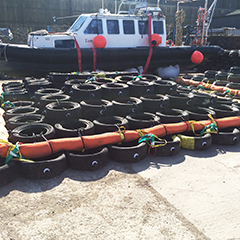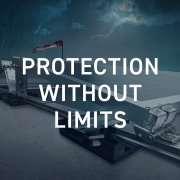Solutions to one of the biggest challenges facing the offshore wind industry lie in technology using recycled car tyres developed in the East of England.
Corrosion and scour has been highlighted as one of the main problems of offshore wind operations and maintenance in a survey of industry executives.
An award-winning invention by an East of England company, trialed on a wind farm off the Norfolk coast and successfully used in a recent major North Sea project, was designed to provide a cost-effective and efficient answer to the problem.
Of the 235 European offshore industry executives asked in the Wind Energy Update survey: ‘What are the biggest challenges facing your O&M teams? 15 per cent pointed to the impact of corrosion and scour.
A patented scour prevention mat, developed by Lowestoft-based Scour Prevention Systems Ltd, uses end-of-life tyres fastened together to make matrixes, used in single or multi layers to protect all offshore turbines, platforms, foundations, pipelines and cables.
With 63 per cent of the UK offshore wind market off the East of England, its office in the innovation hub OrbisEnergy overlooking the North Sea has inspired the SPSL team in its many years of developing, testing, trialing and evolving the design of its system of mats.
Its modular versions, cable crossing units (CCU), were recently laid on the seabed to protect pipeline and cable crossings on a project by Tampnet, provider of the largest offshore high capacity communication network in the world, on its installation of new fibre optic cables connecting offshore platforms.
John Balch, SPSL chairman, said the development team had predicted the issue of scour and corrosion long ago and patented their product.
“We have a patented solution for preventing and remediating scour for offshore foundations, turbines, platforms, cables and pipelines and everything that needs protecting on the sea bed.”
“Our first commercial project was in the offshore oil and gas industry, working with partners such as Tampnet, who has embraced our innovative approach.
“The results of our CCUs demonstrate the ease of installation using ROVs, and the advantages of using recycled car tyres as an effective way to protect pipelines/cables for cables crossing over offshore pipelines.”
More than 3,300 recycled car tyres were used in mats, laid in layers to form a ramp either side of the pipeline allowing safe cable installation, with a traditional scour prevention mat laid over the top for extra protection.
The solution protected the cable from unnecessary “free spanning” of the cable.
Rolf Bøe, project manager at Tampnet said: “The team at Scour Prevention Systems were great to work with, being more than willing to spend time looking at a new process, and managing to design and construct the units exactly as we had envisioned them. We look forward to working together with the SPSL team in the future.”
In the Wind Energy Update survey – European Offshore Wind Operations and Maintenance Series – industry executives were questioned on issues ranging from budget priorities to key challenges servicing offshore farm sites.
In a summary of the report, project director Victoria Auckland said the answers provided “a valuable and timely insight into the most pressing issues and concerns facing the growing European offshore wind O&M sector.”
The issues will be discussed at Offshore Wind O&M Europe in London in November.
SPSL has also been working with the Offshore Renewable Energy (ORE) Catapult – the UK’s flagship technology innovation and research centre for offshore wind, wave and tidal energy – on its pilot support programme.
Catapult has worked with the team to help it develop its commercialisation of its product.
Terry Hogg, ORE Catapult commercialisation manager, said: “We’ve been working with the SPSL team through our pilot SME support programme and with promising results.
“We’ve looked at the market requirements and growing need for scour prevention technologies, engaged a number of senior industry players, and using our technical knowledge and experience we have mapped out a route to support and strengthen their market and business development plans. We now look forward to working with the team in implementing those plans.”
Given the scale of scour across the North Sea and beyond, SPSL are currently in dialogue with a number of offshore operators and developers who are keenly interested in using its innovative solution to mitigate, remediate, and prevent the onset of offshore scour.
More information can be found at www.scourprevention.com













